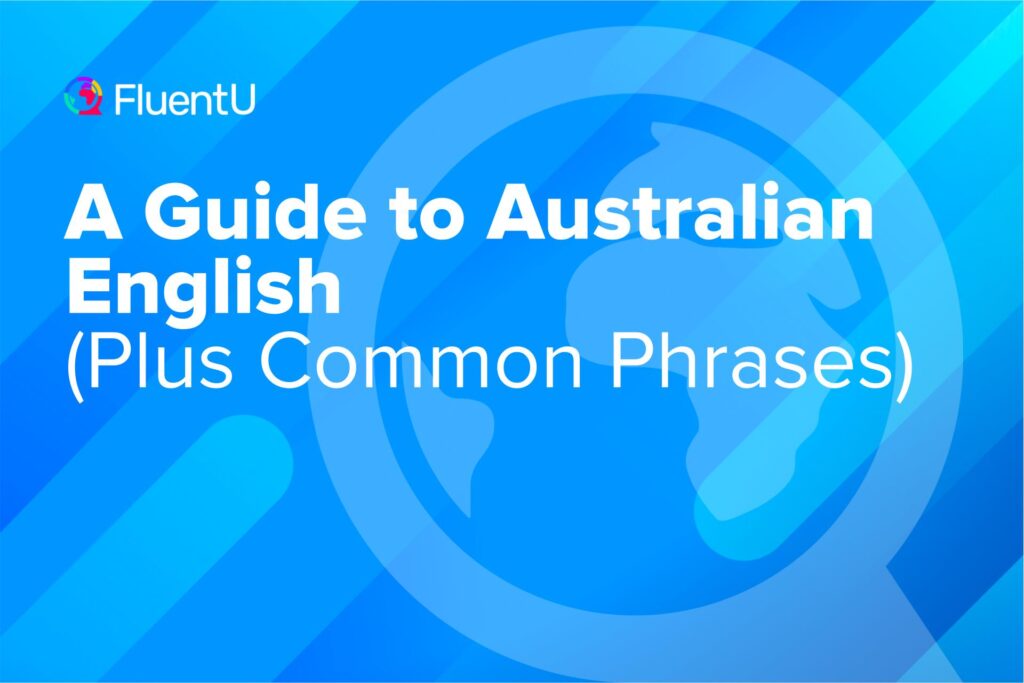A Guide to Australian English (Plus Common Phrases)

You’ve probably heard about Australia—fresh food, gorgeous beaches, sunshine and (of course) killer animals. Crocodiles, sharks and spiders aside, you’re probably more afraid of the dialect than you are of the wildlife (animals).
Unless you’re an advanced learner of English, Australian English can seem like a whole new world. It’s similar to British English in that, for example, it often skips the “r” sound and uses British spelling. But over time, it developed its own unique sound, vocabulary and slang.
So, let me give you a rundown (summary) of phrases unique to the English used in Australia.
Download: This blog post is available as a convenient and portable PDF that you can take anywhere. Click here to get a copy. (Download)
A Brief History of Australian English
Ever wondered why the English used in Australia sound a bit like British English?
Back in the 18th century, Australia was part of the British Empire. British convicts (people who were found to have committed crimes) were transferred to Australia. A lot of other immigrants followed, including soldiers and their families. Most of them came from London, but their different dialects started merging (combining) together:
Of course, Australian English was also influenced by local languages like those from the aboriginals (people who lived in Australia before the British people came). For example, a lot of animal names are aboriginal words ( kangaroo and koala ), as well as fun slang like yakka (hard work).
To explore this dialect of English, check out some podcasts, movies and TV shows. There’s also FluentU, which collects native English videos from Australia and other English-speaking countries for language learners.
FluentU takes authentic videos—like music videos, movie trailers, news and inspiring talks—and turns them into personalized language learning lessons.
You can try FluentU for free for 2 weeks. Check out the website or download the iOS app or Android app.
P.S. Click here to take advantage of our current sale! (Expires at the end of this month.)

Tips for Australian English Pronunciation
- Be “lazy.” No, I’m not saying you shouldn’t do anything at all. Rather, you need to pronounce words more slowly. Make your vowel sounds extra long. Pretend to be very tired when you speak, and you’ll sound like a native in no time. It’s not very hard—just give it a try!
- Skip letters at the ends of words. Australians don’t pronounce the letters at the ends of many words. For example “what?” becomes “wha?” Meeting, going and trying change to meetin, goin and tryin.
- Change letters at the ends of words. You must change the letters at the ends of some words. The words super, after, dinner and order become supah, aftah, dinnah and ordah.
- Turn “oo” sounds into “ew” sounds. When words are spelled with “oo,” you need to change the sound you make when you pronounce these words. The best examples of this are pool, school and cool. Australians change these words to pewl, skewl and kewl.
Want to hear how all of this sounds when a native Australian is speaking English? Watch this fun video clip for a great demonstration:
Common Australian Slang
1. G’day
This word has many meanings. It’s probably the most common word you’ll hear while you’re in Australia.
It can be the same as “Hello” or “How are you?” in American English. Some people just say it when they make eye contact with another person on the street.
The pronunciation of this word can be tricky (difficult). It isn’t “good day” or “geh-day.” You have to cut the “g” sound short and emphasize the “day.” Meanwhile, the “day” sounds similar to “daaey.”
2. Mate
This means the same as “friend.”
For example:
G’day, mate. (Hello, friend.)
However, you can use mate in many other ways.
If someone asks you how your weekend was, the typical reply from (male) Australians is Maaaate. Used in this way, it means, “I can’t even begin to describe how awesome it was.”
You can also use mate when you pass people on the street. If you make eye contact with a stranger, simply nod your head and say mate as a simple, casual greeting. This is a friendly way to acknowledge them.
3. How ya going?
This simply means, “How are you?”
Let’s break this down:
- Ya is a casual form of “you.”
- Going simply refers to how you are: good, sad, angry or excited. In this context, going means the act of being alive or existing. So, the person is asking how you’re feeling or how your day is/was.
Now, try using the above three vocabulary words and phrases in a sentence together:
4. Crikey!
This word is an interjection. An interjection is often followed by an exclamation mark (!). That’s why it’s sometimes also known as an exclamation .
Crikey, being an interjection, is almost always followed by an exclamation mark.
Most Australians grow up hearing this word. The word is used as an exclamation of surprise or bewilderment (confusion). You can also use it to replace words/phrases like “Wow!” or “What on earth?”
For example:
Crikey! Did you see the size of that snake?
Crikey is mainly used by older generations. However, it became popular again when the late Crocodile Hunter, Steve Irwin, became famous. (In this context, late means someone who has passed away or died, not something or someone who didn’t come on time.)
5. Streuth
This word is a synonym (word or phrase that means the same) of “crikey.”
Streuth has a particular pronunciation, so you need to pay attention to this. It’s pronounced like “Strooooth.”
There’s an emphasis on the “ooo” sound, and it must be drawn out. In other words, pronounce the word in the laziest way you can! Like the word crikey, it’s an expression of shock or surprise. For example:
Streuth! You were nearly attacked by a shark?!
6. Fair dinkum
The word dinkum began in the Australian goldfields.
Dinkum originally came from a Chinese dialect. It can be translated to mean “true gold” or “good gold.” In case you’re wondering why there’s a Chinese word in Australian English, there were many Chinese people searching for gold in Australia in the 1800s.
You say fair dinkum when you want to state a fact or truth. For example:
7. Heaps good
Young Australians like to replace the word “very” with heaps . So, this phrase literally means “very good.”
It shows that something you’ve done, eaten or achieved is very, very, very good.
Australians are used to hearing things like “Very good work, Emma” or “You have been very good today, here is your reward.” Because of this, young Australians became so sick and tired of hearing “very good” that they simply created their own version of the phrase.
Adults and seniors understand this phrase, but it’s most commonly used by Australians aged 10 to 20:
Anne: How was your vacation?
Bob: It was heaps good.
8. Fully sick
Fully here means the same as in American English—that is, “completely” or “entirely.” For example, you’d say, “I fully understand the math equation.”
But why the word sick ? Isn’t it bad to be sick?
Well, when Australians say fully sick, it doesn’t mean that a person is really sick. It means the opposite!
Fully sick means “great” or “very good quality.” Most surfers use this phrase when they talk about the ocean. For example:
Adam: The surf was fully sick today!
Julie: Fully sick!? How big were they?
Adam: They were at least seven metres high!
By the way, Australia uses the metric system of measurement. That means that, unlike Americans, they describe length (how long a thing is) in metres ( meter in American English) rather than feet . (If you’re curious about how many feet seven meters is, it’s about 23 feet.)
You can also use this word to describe parties, cars and other things that you like:
Adam: Check out my fully sick ride!
Julie: Wow, nice car!
9. Yeah, nah
Yeah, nah is one of the most confusing Australian expressions. To break it down:
So what do Australians really mean when they say this to you? Well, it basically means, “Yes, I understand what you’re saying. But no, I don’t agree with you.” It’s a way to disagree with someone without sounding too harsh.
Australians are known for being direct or straight to the point , but this is one common expression where they aren’t:
Julie: Let’s try out this new restaurant!
Bob: Yeah, nah, it’s gotten bad reviews so far.
10. She’ll be right
The first thing you should know about this phrase is that she doesn’t actually mean a female person.
In Australian slang, she can be used to mean everything.
What this casual expression is saying is that everything will be all right. Australians sometimes use it in response to bad news or negative situations:
Adam: I didn’t get that raise I was hoping for.
In this context, it can an encouraging expression. It can also imply that all you can do now is hope for things to improve.
Another meaning of this phrase is something could still be better, but it’s okay enough for you:
This apartment is a bit further away than I expected, but she’ll be right.
11. True blue
This phrase means “the real thing.”
The color blue represents loyalty and truth. So, the phrase true blue describes something that’s seen as genuine, real or honest.
In fact, it’s the title of a song by Australian singer John Williamson, which you can watch below:
From the song, see if you can pick out any other words that you don’t know.
Now, let’s combine everything we’ve learned about the English used in Australia in the phrases below:
Adam: G’day mate! How ya going? How was your weekend?
Adam: Sounds great! How was the beach?
John: True blue! Which reminds me, I’m on my way to get my phone fixed because I dropped it in the water.
Adam: Mate, she’ll be right, I had that same problem and they got it patched up fast.
John: I hope so. See you later then!
Adam: Bye!
For a ton more everyday Australian expressions, you can check out this guide:
102 Australian Slang Words and Phrases | FluentU English Blog
Australian slang words are ridiculously fun and creative. This post covers 102 of the coolest and most common Australian slang words, so you’ll sound more like an…
By getting familiar with the sounds and phrases of the English used in Australia, you’ll have no problem speaking to any true blue Australian!
Download: This blog post is available as a convenient and portable PDF that you can take anywhere. Click here to get a copy. (Download)
And One More Thing...
If you like learning English through movies and online media, you should also check out FluentU. FluentU lets you learn English from popular talk shows, catchy music videos and funny commercials, as you can see here:
The FluentU app and website makes it really easy to watch English videos. There are captions that are interactive. That means you can tap on any word to see an image, definition, and useful examples.
For example, when you tap on the word "searching," you see this:
Learn all the vocabulary in any video with quizzes. Swipe left or right to see more examples for the word you’re learning.

FluentU helps you learn fast with useful questions and multiple examples. Learn more.
The best part? FluentU remembers the vocabulary that you’re learning. It gives you extra practice with difficult words—and reminds you when it’s time to review what you’ve learned. You have a truly personalized experience.
Start using the FluentU website on your computer or tablet or, better yet, download the FluentU app from the iTunes or Google Play store. Click here to take advantage of our current sale! (Expires at the end of this month.)










